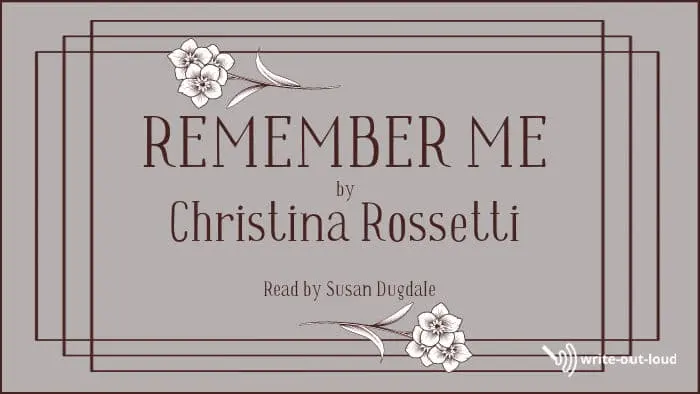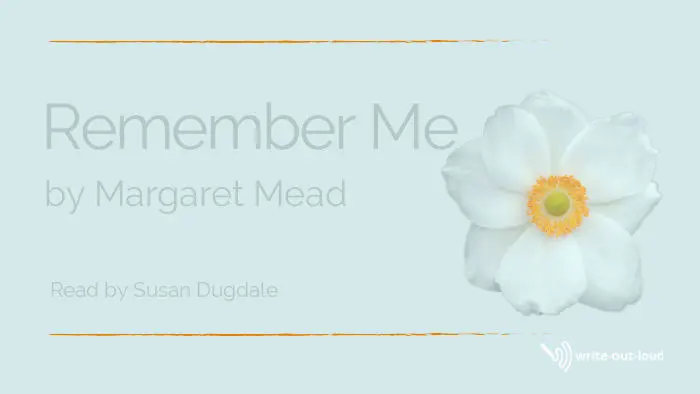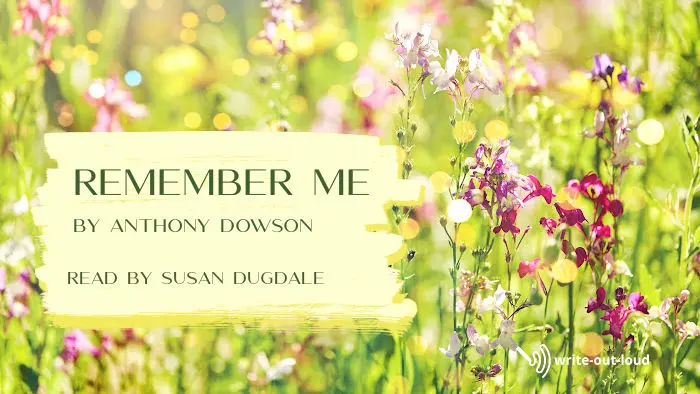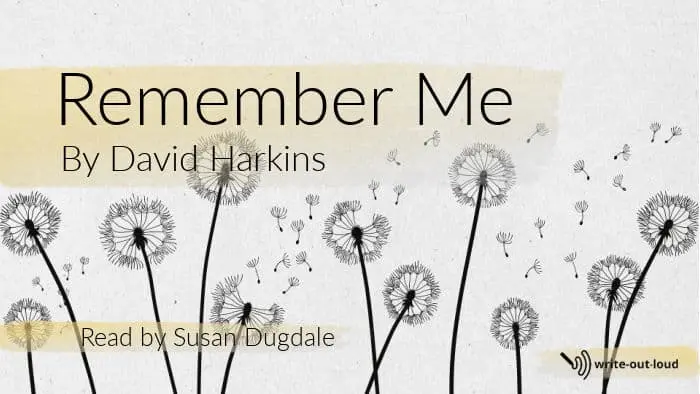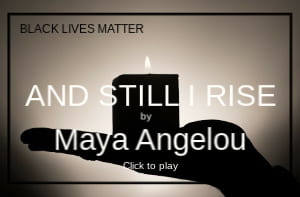- HOME ›
- Resources for eulogies ›
- Funeral poems: Remember Me
Funeral poems: Remember Me
Uplifting comforting poems for funerals
By: Susan Dugdale
There are at least four funeral poems with the same title: 'Remember Me'. All of them are among the most loved and frequently chosen readings for a memorial service.
Click a title link below to read the text of the poem, to listen to it being read, to find out more about its meaning (how to interpret it) and its background.
If you like the poem and want a copy of it for your own use, there's a printable (pdf) for you to download.
- Remember Me by Christina Rossetti
- Remember Me by Margaret Mead
- Remember Me by Anthony Dowson
- Remember Me by David Harkins
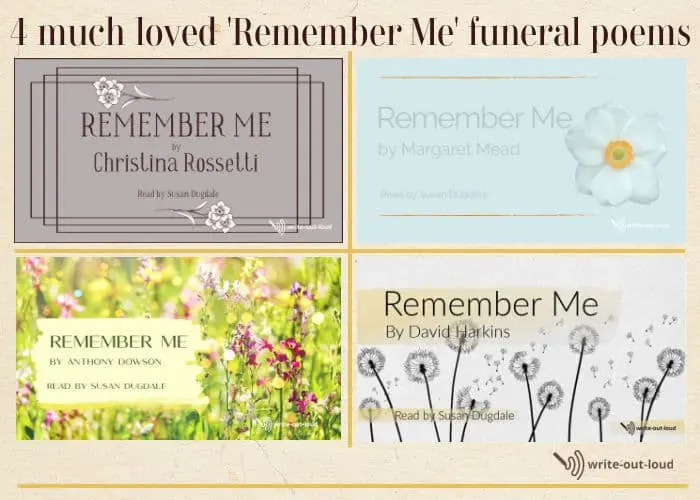
Remember Me by Christina Rossetti 1849
Remember me when I am gone away,
Gone far away into the silent land;
When you can no more hold me by the hand,
Nor I half turn to go yet turning stay.
Remember me when no more day by day
You tell me of our future that you plann'd:
Only remember me; you understand
It will be late to counsel then or pray.
Yet if you should forget me for a while
And afterwards remember, do not grieve:
For if the darkness and corruption leave
A vestige of the thoughts that once I had,
Better by far you should forget and smile
Than that you should remember and be sad.
Interpreting 'Remember Me' by Christina Rossetti
The poem is written from the point of view of a person who is either dead or dying. They are speaking to their lover: issuing a series of instructions about how they want to be remembered.
In the first four lines the lover is told they must remember what they shared when the speaker is dead: gone to the 'silent land' where both physical touch and returning (coming back to life) are impossible.
The next four lines are about a cherished vision of their future together: something that was frequently talked about and planned for. Again, the lover is instructed to remember and to fully comprehend (understand) what has been destroyed by death. No amount praying or advice will alter that fact. It's too late. Dead is dead.
The last six lines reveal a change of heart, a shifting of perspective. The speaker is no longer demanding their lover keep their shared love alive by making its memory the focus of all their thoughts and feelings.
Instead, they are given permission to forgive themselves if they 'forget' because remembering, living in the past, will only bring pain. Despite the bitterness of dying, the speaker wants their lover to 'smile': to go on to have a full and happy life.
For a more detailed analysis please see: Dalli, Elise. "Remember by Christina Rossetti". Poem Analysis.
Listen to Remember Me by Christina Rossetti
Click on the either the image or the link to hear a reading of the poem on YouTube: Remember Me read by Susan Dugdale.
Download a printable of the poem
Click the link to get a printable of Remember Me by Christina Rossetti.
Remember Me by Margaret Mead
To the living, I am gone.
To the sorrowful, I will never return.
To the angry, I was cheated,
But to the happy, I am at peace,
And to the faithful, I have never left.
I cannot be seen, but I can be heard.
So, as you stand upon a shore, gazing at a beautiful sea - remember me.
As you look in awe at a mighty forest and its grand majesty - remember me.
As you look upon a flower and admire its simplicity - remember me.
Remember me in your heart, your thoughts, your memories of the times we loved,
the times we cried, the times we fought, the times we laughed.
For if you always think of me, I will never be gone.
Interpreting 'Remember Me' by Margaret Mead
The first part of the poem is a reflection on the many ways people view death. Each example the speaker uses is an extension, or projection, of an individual's core beliefs and attitudes.
For instance, someone who is generally angry will feel anger on behalf of the person who's died, because they assume they'll feel cheated. Afterall, they've had their life cut short or stolen.
In the line immediately following the five differing perspectives on death, the speaker introduces their own: 'I cannot be seen, but I can be heard.'
In the next section the speaker links themselves with the beauty of the natural landscape: the sea, the beach, the forest, a flower, by telling people to 'remember me' as they pause to admire it.
The last part tells people what to remember while they pause: the good, the difficult...all of it. The conclusion affirms the speaker's belief that if people continue to think about them, they are still present in their lives.
The repetition of phrases: 'to the...' in the first section, 'remember me' and 'the times we...', as well as the word 'your', in the last two sections, emphasize the significance of the speaker's message.
The poem offers hope and comfort. Death, it says, is not final. Life, including that of someone who has died, carries on.
Click this Wikipedia link to find out more about American Anthropologist Margaret Mead (1901-1978).
Listen to Remember Me by Margaret Mead
Click on the either the image or the link to hear a reading of the poem on YouTube: Remember Me by Margaret Mead.
Download a printable of the poem
Click the link a printable of Remember Me by Margaret Mead.
Remember Me by Anthony Dowson
Speak of me as you have always done.
Remember the good times, laughter, and fun.
Share the happy memories we've made.
Do not let them wither or fade.
I'll be with you in the summer's sun
And when the winter's chill has come.
I'll be the voice that whispers in the breeze.
I'm peaceful now, put your mind at ease.
I've rested my eyes and gone to sleep,
But memories we've shared are yours to keep.
Sometimes our final days may be a test,
But remember me when I was at my best.
Although things may not be the same,
Don't be afraid to use my name.
Let your sorrow last for just a while.
Comfort each other and try to smile.
I've lived a life filled with joy and fun.
Live on now, make me proud of what you'll become.
Interpreting 'Remember Me' by Anthony Dowson
Like the two preceding 'Remember Me' poems, this too is written from the perspective of the person who has died and speaks directly to those who mourn for them.
The speaker tells them to continue to talk about them, to share their stories, and to not let them go, ('wither or fade').
Like the Margaret Mead 'Remember Me', this poem also promises the deceased will be with those who love and miss them in nature, emphasizing they'll be present regardless of the season, 'summer through to winter', i.e., all the time.
The bereaved are assured that the speaker is now at peace. They say whatever miseries were present in their final days have gone and ask to be remembered when they were well, happy and enjoying life.
The poem acknowledges the grief of those who love them, the gap left by the deceased and how different their lives will be. Despite that, the speaker wants their loved ones to work through their sadness, to comfort each other and then move on to become the best version of themselves they can be.
Listen to Remember Me by Anthony Dowson
Click on the either the image or the link to hear a reading of the poem on YouTube: Remember Me by Anthony Dowson.
Do you know anything about Anthony Dowson?
I've searched and can't find anything about Anthony Dowson or his poem. Although the poem is featured on numerous websites, there's nothing covering its background or the man it's attributed to. If you've got information about either, I'd love to have it to add to this page. Please let me know through the form on my contact page. Thank you.
Download a printable of the poem
Click the link to get a printable of Remember Me by Anthony Dowson.
Remember Me by David Harkins 1982
Do not shed tears when I have gone but smile instead because I have lived.
Do not shut your eyes and pray to God that I'll come back but open your eyes and see all that I have left behind.
I know your heart will be empty because you cannot see me but still, I want you to be full of the love we shared.
You can turn your back on tomorrow and live only for yesterday or you can be happy for tomorrow because of what happened between us yesterday.
You can remember me and grieve that I have gone, or you can cherish my memory and let it live on.
You can cry and lose yourself, become distraught and turn your back on the world or you can do what I want - Smile, wipe away the tears, learn to love again and go on.
Interpreting Remember Me by David Harkins
This 'Remember Me' poem is made up of a series of choices, or actions, the speaker (the deceased) is telling or asking those who love them to make.
While acknowledging the grief and sadness they feel, they're being encouraged to look beyond it, to see and feel gratitude for the richness, love and happiness they shared in each other's company.
They are to use that legacy as a foundation to build a new life on: one made sweeter and fuller through having known and loved the person who has died.
Remaining stuck, paralyzed by the misery of loss, is not what the speaker wants. They are to get on and live!
Listen to Remember Me by David Harkins
Click on the either the image or the link to hear a reading of the poem on YouTube: Remember Me by David Harkins.
Remember Me - a brief history
This 'Remember Me' poem has an intriguing history. It was written sometime in either 1980 or 1981 and not actually about death but unrequited love.
At that time, David Harkins, was attempting to establish himself as a poet. He sent the poem amongst others to varying publishers who rejected them.
Later his 'Remember Me' poem was found and used, without attribution, as a condolence message.
Download a printable of the poem
Click the link to get a printable of Remember Me by David Harkins.
'Remember Me' becomes 'She Is Gone'
Then, sometime later again, someone altered it to 'She Is Gone': the version of the poem the late Queen Elizabeth 2nd chose to include in the memorial service of her mother in 2002. The poem was an instant popular success.
After much speculation over who the Anonymous behind 'She Is Gone' might be, David Harkins came forward to claim it. His proof was the original version, 'Remember Me', which 'She Is Gone' is derived from.
The text, and a printable, of the newer poem is below.
If you need to, change the personal pronoun 'She' to suit and depending on your choice, alter the verbs as required to make it read properly.
E.g., 'she' to 'he', 'she' to 'they' or 'she' to 'I'.
If you use either 'they' or 'I' you'll need to make changes. I've done the first two lines below using 'they' to show you.
You can shed tears that they are gone,
Or you can smile because they have lived.
For more about She Is Gone.
She Is Gone by David Harkins
You can shed tears that she is gone,
Or you can smile because she has lived.
You can close your eyes and pray that she will come back,
Or you can open your eyes and see all that she has left.
Your heart can be empty because you can’t see her,
Or you can be full of the love that you shared.
You can turn your back on tomorrow and live yesterday,
Or you can be happy for tomorrow because of yesterday.
You can remember her and only that she is gone,
Or you can cherish her memory and let it live on.
You can cry and close your mind, be empty and turn your back,
Or you can do what she would want: smile, open your eyes, love and go on.
Download a printable of the poem
Click the link to get a printable of She Is Gone.
More funeral poems & other memorial resources
Sample eulogies: over 70 examples which include some for mothers, fathers, grandmothers and grandfathers, brothers, sisters, sons, friends...These have been sent to me to post on write-out-loud by people from all around world. Our hope is that they help those looking for inspiration in order to write a eulogy of their own.
More funeral poems and readings, how to write a eulogy step by step, how to read a poem aloud...

About the Author: Susan Dugdale, founder of write-out-loud.com, is a qualified teacher of English and drama with over 40 years of experience. Drawing on her professional expertise and her personal journey from shyness to confidence, Susan creates practical, real-world resources to help people find their voice and speak with power.
